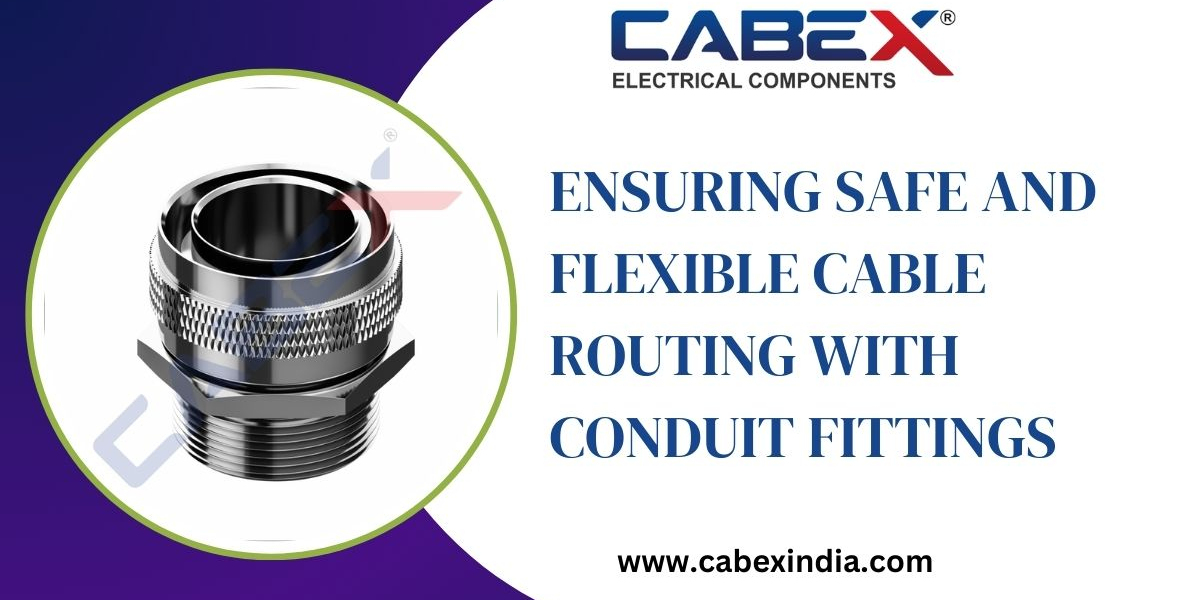Flexible Conduit Fittings are integral components in modern electrical systems, designed to protect and secure wiring in environments where flexibility and durability are essential. At Cabex India, we are committed to providing top-tier flexible conduit fittings, ensuring safety, performance, and compliance with industry standards.
What Are Flexible Conduit Fittings?
Flexible conduit fittings are specialized connectors used in conjunction with flexible conduits to safeguard electrical wires. These fittings ensure a secure connection between conduits and junction boxes, equipment, or other electrical devices. Their primary purpose is to facilitate flexibility while protecting against dust, moisture, vibration, and other environmental factors that could compromise electrical safety.
Key Features of Flexible Conduit Fittings
1. Robust Protection
Flexible conduit fittings provide enhanced protection against mechanical stress, moisture, and dust, ensuring long-term durability in various applications.
2. Versatile Design
These fittings are available in a range of designs, including straight, angled, and threaded variants, catering to diverse system requirements.
3. Ease of Installation
Flexible conduit fittings are designed for quick and secure installation, reducing downtime and labor costs.
4. Resistance to Environmental Factors
Constructed from high-quality materials like stainless steel, brass, or polymer, these fittings resist corrosion, chemicals, and temperature extremes.
Types of Flexible Conduit Fittings
1. Straight Fittings
Straight conduit fittings connect conduits to enclosures or junction boxes, providing a seamless and secure link for wiring.
2. Elbow Fittings
Elbow fittings enable conduits to bend at specific angles, such as 45 or 90 degrees, ensuring flexibility in routing electrical wires.
3. Liquid-Tight Fittings
These fittings are designed to maintain a waterproof seal, making them ideal for environments exposed to moisture or liquids.
4. Threaded Fittings
Threaded fittings offer a secure and vibration-resistant connection, commonly used in high-stress environments.
5. Compression Fittings
Compression fittings create a tight seal by compressing the conduit against the fitting body, providing excellent protection against environmental elements.
Advantages of Using Flexible Conduit Fittings
1. Enhanced Flexibility
Flexible conduit fittings allow for easy adjustments in wiring paths, accommodating tight spaces and intricate layouts.
2. Improved Safety
By protecting wires from physical damage and environmental hazards, these fittings ensure the safety and reliability of electrical systems.
3. Cost-Effective Solutions
Their durability and resistance to wear and tear reduce maintenance costs over time, making them a cost-effective choice.
4. Compatibility
Flexible conduit fittings are compatible with a wide range of conduits, including metallic and non-metallic variants.
5. Compliance with Standards
Top-quality fittings adhere to international safety and performance standards, ensuring reliable operation across industries.
Applications of Flexible Conduit Fittings
1. Industrial Environments
In factories and manufacturing plants, flexible conduit fittings protect wiring from vibration, chemicals, and mechanical impact.
2. Commercial Buildings
Flexible conduit fittings are used extensively in office complexes and retail spaces to ensure secure and concealed electrical wiring.
3. Outdoor Installations
For outdoor applications, liquid-tight conduit fittings safeguard wires against moisture, dust, and temperature fluctuations.
4. Transportation Systems
From trains to airplanes, flexible conduit fittings are used to protect electrical wiring in dynamic and high-vibration environments.
5. Renewable Energy
Solar and wind energy installations rely on flexible conduit systems to route and protect wiring in harsh conditions.
Materials Used in Flexible Conduit Fittings
1. Stainless Steel
Highly durable and corrosion-resistant, stainless steel fittings are ideal for harsh industrial and marine environments.
2. Brass
Brass fittings offer excellent thermal conductivity and resistance to corrosion, making them suitable for indoor and outdoor use.
3. Nylon
Lightweight and flexible, nylon fittings provide resistance to abrasion, chemicals, and UV exposure.
4. PVC
PVC fittings are cost-effective and provide good insulation, commonly used in residential and commercial applications.
How to Choose the Right Flexible Conduit Fittings
1. Assess the Application
Identify the operating conditions, such as temperature, moisture, and mechanical stress, to select appropriate materials and designs.
2. Determine Size Requirements
Choose fittings that match the diameter and type of conduit being used for a secure connection.
3. Consider Environmental Factors
For applications in wet or corrosive environments, opt for liquid-tight or corrosion-resistant fittings.
4. Evaluate Compliance
Ensure the fittings comply with relevant safety standards like IP ratings and UL certifications.
5. Consult Experts
Seek advice from trusted suppliers like Cabex India to find the ideal fittings for your specific needs.
Installation Tips for Flexible Conduit Fittings
1. Prepare the Conduit
Cut the conduit to the required length and remove any sharp edges to ensure a smooth fit.
2. Use the Right Tools
Utilize tools designed for conduit installations to avoid damage and ensure precision.
3. Secure the Connection
Tighten the fittings appropriately to create a secure and leak-proof connection without over-tightening.
4. Test for Integrity
Conduct leak and continuity tests to verify the reliability of the installed system.
5. Perform Regular Inspections
Periodic checks ensure the fittings remain secure and free from damage over time.
FAQs About Flexible Conduit Fittings
1. What are flexible conduit fittings used for?
They are used to connect flexible conduits to electrical enclosures, junction boxes, and devices, providing protection and secure wiring paths.
2. Are these fittings waterproof?
Yes, specific fittings like liquid-tight variants are designed to provide waterproof protection.
3. What materials are best for outdoor applications?
Stainless steel and brass are ideal for outdoor use due to their corrosion resistance and durability.
4. Can these fittings handle high temperatures?
Many flexible conduit fittings are designed to withstand extreme temperatures; check product specifications for temperature ratings.
5. Where can I find high-quality flexible conduit fittings?
You can explore a wide range of top-quality fittings at Cabex India.
Conclusion
Flexible conduit fittings are a vital component in ensuring the safety, flexibility, and longevity of electrical systems across industries. With options tailored to meet various operational needs, these fittings provide secure connections and robust protection in challenging environments. At Cabex India, we offer an extensive range of premium flexible conduit fittings, crafted to deliver exceptional performance and reliability.
To learn more and find the perfect solutions for your projects, visit Cabex India.








